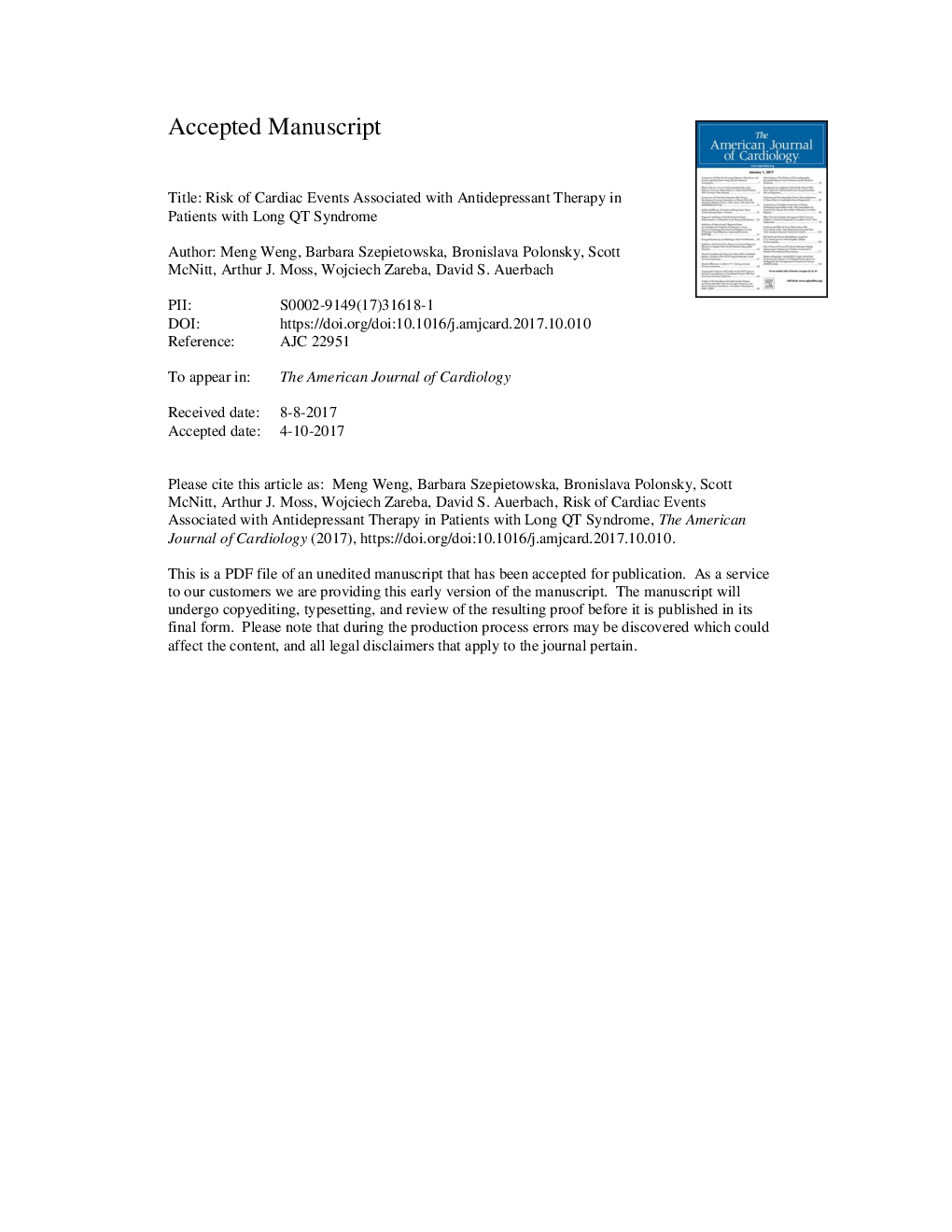| کد مقاله | کد نشریه | سال انتشار | مقاله انگلیسی | نسخه تمام متن |
|---|---|---|---|---|
| 8651566 | 1572069 | 2018 | 25 صفحه PDF | دانلود رایگان |
عنوان انگلیسی مقاله ISI
Risk of Cardiac Events Associated With Antidepressant Therapy in Patients With Long QT Syndrome
دانلود مقاله + سفارش ترجمه
دانلود مقاله ISI انگلیسی
رایگان برای ایرانیان
موضوعات مرتبط
علوم پزشکی و سلامت
پزشکی و دندانپزشکی
کاردیولوژی و پزشکی قلب و عروق
پیش نمایش صفحه اول مقاله

چکیده انگلیسی
Patients with long QT syndrome (LQTS) are at a high risk of cardiac events. Many patients with LQTS are treated with antidepressant drugs (ADs). We investigated the LQTS genotype-specific risk of recurrent cardiac arrhythmic events (CAEs) associated with AD therapy. The study included 59 LQT1 and 72 LQT2 patients from the Rochester-based LQTS Registry with corrected QT (QTc) prolongation and a history of AD therapy. Using multivariate Anderson-Gill models, we estimated the LQTS genotype-specific risk of recurrent CAEs (ventricular tachyarrhythmias, aborted cardiac arrest, or sudden cardiac death) associated with time-dependent ADs. Specifically, we examined the risk associated with all ADs, selective serotonin reuptake inhibitor (SSRI), and ADs classified on the CredibleMeds list (www.CredibleMeds.org) as “Conditional” or “Known risk of Torsades de pointes (TdP).” After adjusting for baseline QTc duration, sex, and time-dependent beta-blocker usage, there was an increased risk of recurrent CAEs associated with ADs in LQT1 patients (hazard ratioâ=â3.67, 95% confidence interval 1.98-6.82, pâ<â0.001) but not in LQT2 patients (hazard ratioâ=â0.89, 95% confidence interval 0.49-1.64, pâ=â0.716; LQT1 vs LQT2 interaction, pâ<â0.001). Similarly, LQT1 patients who were on SSRIs or ADs with “Known risk of TdP” had a higher risk of recurrent CAEs than those patients off all ADs, whereas there was no association in LQT2 patients. ADs with “Conditional risk of TdP” were not associated with the risk of recurrent CAEs in any of the groups. In conclusion, the risk of recurrent CAEs associated with time-dependent ADs is higher in LQT1 patients but not in LQT2 patients. Results suggest a LQTS genotype-specific effect of ADs on the risk of arrhythmic events.
ناشر
Database: Elsevier - ScienceDirect (ساینس دایرکت)
Journal: The American Journal of Cardiology - Volume 121, Issue 2, 15 January 2018, Pages 182-187
Journal: The American Journal of Cardiology - Volume 121, Issue 2, 15 January 2018, Pages 182-187
نویسندگان
Meng MS, Barbara MD PhD, Bronislava MS, Scott MS, Arthur J. MD, Wojciech MD PhD, David S. PhD,